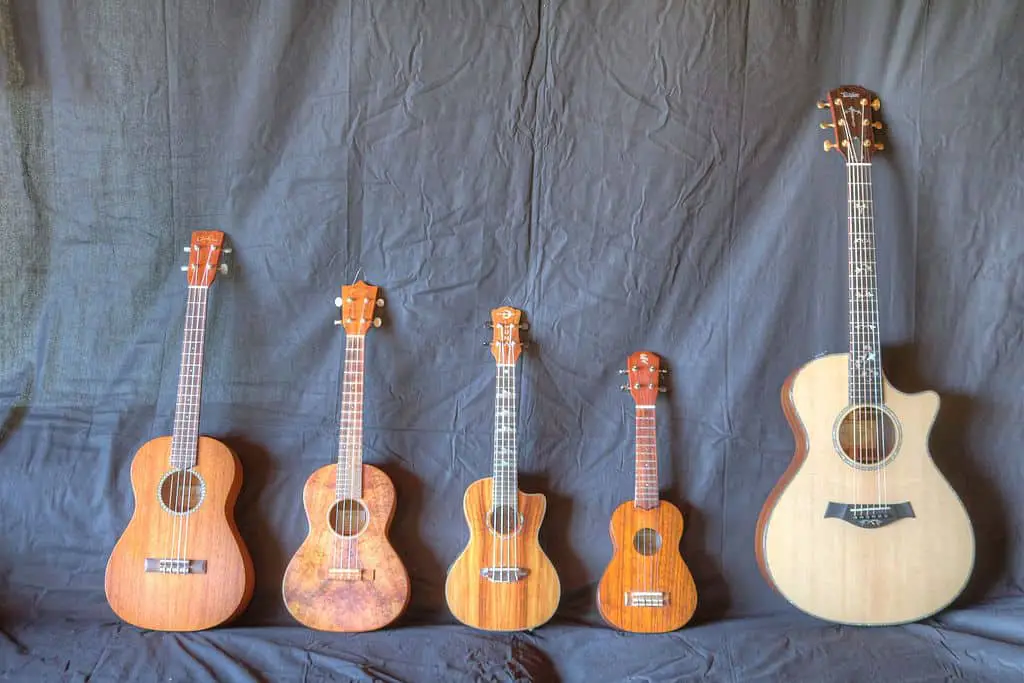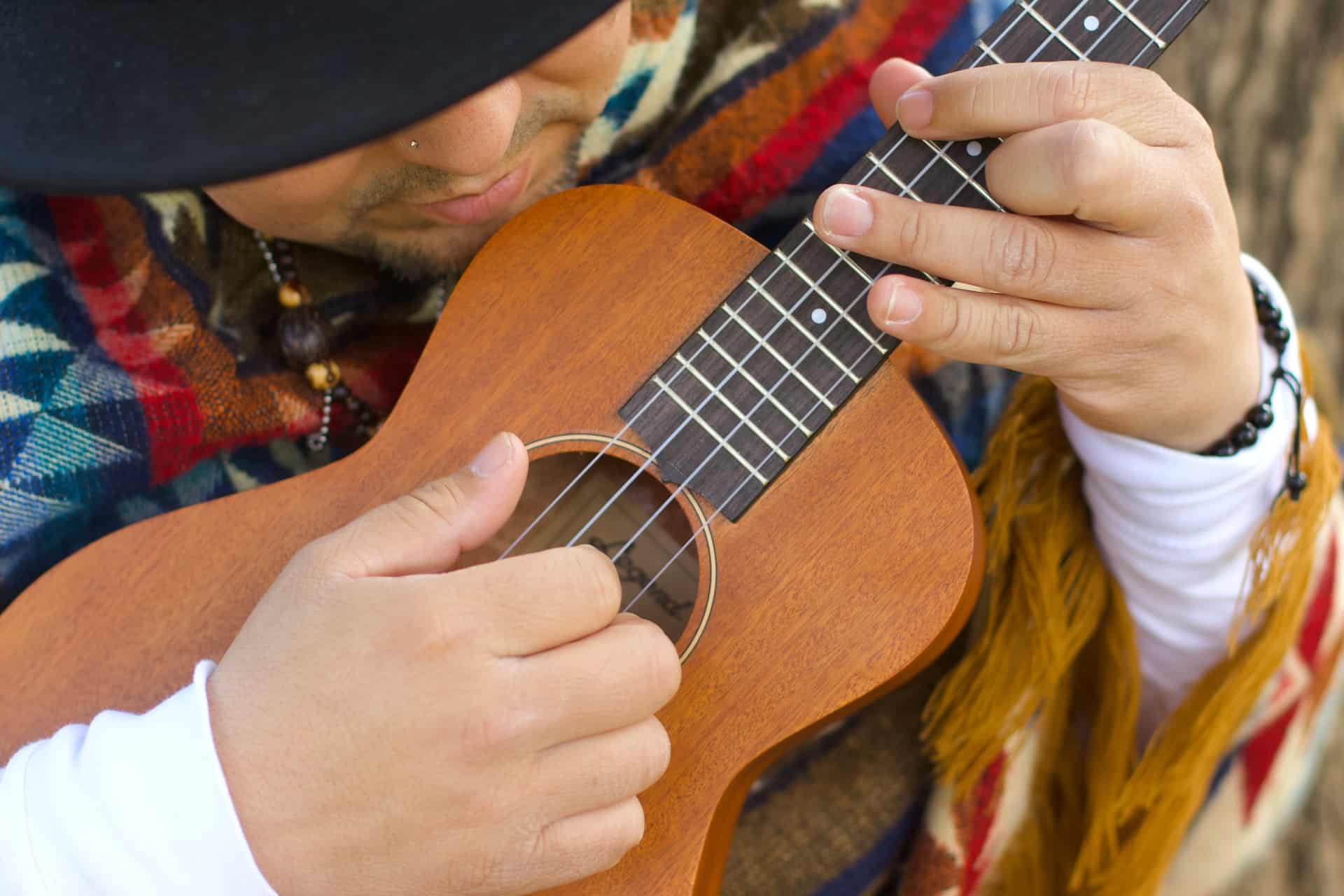Deciding to learn a new instrument is a brave decision. You must put yourself out there and show a great deal of vulnerability and willingness to try something new. The arts, in general, are rewarding endeavors. They can provide entertainment, joy, and meaningful connections. Perhaps you have an interest in music but aren’t sure about picking up a completely different instrument and learning how to use it. This article will outline the differences between the guitar and the ukulele. The appearance, sound quality, price, ease of playing, and finally, some pros and cons of each instrument. Which is easier to learn guitar or ukulele? Let’s find out.
Appearance and style: Guitar versus Ukulele

Just from looking at the two instruments side by side, you can immediately see a fundamental difference in the instruments. Namely, the size. The ukulele is significantly smaller than the guitar. The neck of the instrument, called the fret-board, is also much shorter on the ukulele than it is on the guitar. This, and the overall smaller scale, makes it a great choice for people with smaller hands.
The guitar has six strings, while the ukulele has only 4. By positioning your hands and fingers on these strings, you form different chords. With the smaller and thinner fretboard, the ukulele can be easier for people with small hands. People with large hands may find the guitar easier for finger positioning.
There are different styles of instruments available. The sound quality will be covered in the next section. However, appearance can be important, as well. There are many different styles of instruments available, and it can vary depending on the sound style you are trying to achieve. Ukuleles tend to be styled in with Hawaiian themes. This is where to instrument originated, so many manufacturers model them as such. However, there are plenty of other styles and colors available. Guitars vary greatly in style, from classic acoustic to heavy metal electric guitars. Once you have come to a decision regarding your desired sound style, you will have an easier time selecting your instrument style.
Sound Styles of the Guitar and Ukulele
Consider what style of music you are interested in playing. A rock or punk style may be better suited to the guitar. Softer acoustic sounds will be better suited to the ukulele. Cheerful bright melodies fit perfectly with the ukulele.
Because the guitar is bigger and has more strings, you will have a much broader range of play-ability. Simply speaking, a guitar can produce higher and lower tones, purely because of the size limitations of the ukulele versus the guitar. This range gives you the option to play a variety of styles of music. Head-banging rock and roll, to heartfelt acoustic ballads. These can all be achieved on the guitar.
Although the ukulele does not have as much variety of sound, it is still a lovely unique sound. Hawaiian in style, the ukulele offers a warm, cheerful tone that lends itself well to simple voice and uke duets. There are other styles of ukuleles available as well. The sizes range from soprano, concert, tenor, and baritone. The soprano is the size typically associated with ukulele. It is 20 inches (51 cm) in length. It creates that typical high light ukulele sound. The concert is 23 inches (58 cm) and still sounds like a cheerful ukulele, although the size allows for it to be a bit louder. The tenor is 26 inches (66 cm) and begins to stray from the typical uke sound. It is deeper and sounds much more like a classical guitar. The baritone is the largest ukulele measuring 30 inches (76 cm). This uke strays the most from the typical sound. It is more like an acoustic guitar, and the tuning is different for the baritone uke as well.
Price Points of Guitar versus Ukulele
Prices can vary significantly among guitars, but ukuleles remain low.
If you are not able to invest a large amount of money, then a ukulele is the way to go. Ukuleles can run anywhere between $20-30 for the cheapest and lowest quality to $60-100 for the professional quality versions. If you intend to invest a significant amount of time and effort into your new hobby, a higher quality ukulele will last you longer and be easier to manage with regards to tuning and durability.
Buying used is an excellent method for purchasing a new guitar to start your studies. With this method, you can find a quality guitar without such a high price tag. A new acoustic guitar can range anywhere from $150 to $2,500. Prices for electric guitars vary as much or more than acoustic guitar prices. It is important to do your research on brands before making such a large purchase. Head to your local music shop, they will be able to assist you in finding the perfect guitar for your skill level.
Which is easier to learn Guitar or Ukulele?
So, the biggest question of all: which is easier to learn guitar or ukulele?
In terms of the learning curve for a new instrument, the ukulele is indeed easier to pick up. There are only 4 strings, which makes playing chords easier. The tension on these strings is lower, they are easier to press and keep pressing. If you are a complete beginner and your desire is to pluck out a song by next week, then the ukulele is for you.
However, there is also a good counterargument for the guitar being easier. The ukulele is significantly smaller, and therefore it can be harder for people with big hands. Also, the guitar is the more popular instrument, there are many venues available for lessons. Online courses are a great way for beginners to learn. Guitar Tricks is such a course. This course gives the new student hands-on learning experience all from the comfort of your home. Many teachers offer in-person lessons, as well. Your local music shop should be able to point you in the right direction.
Which instrument is right for you?
After reading this article, you should have a better understanding of the pros and cons of both the guitar and ukulele. They each have their own specific appeal. The small, sweet, easily portable, and simple ukulele might be just the right fit for you. Or, the larger, more variable style and sound of the guitar might be exactly what you’re looking for. Whichever instrument you choose, your experience will be rewarding and fun, especially with the number of resources out there for new learners. Have fun learning, and don’t forget to practice!



